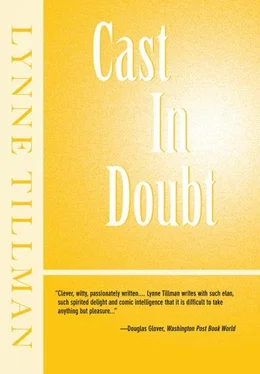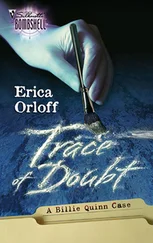Ultimately — and I had determined never to bring it up — I expressed my disappointment in reading Helen’s diary; I said I had not found what I was looking for. At some point in the years since I’d seen Gwen, I had been startled to recall the Gypsy’s premonitory dictum, or curse: You only look for the right things. I now related to Gwen the specifics of the Gypsy’s reading of my palm. Gwen dismissed it, actually she went “Pooh-pooh, Lulu.” with much droll humor, her conclusion was that it was just like me to suffer from a fate neurosis when that particular neurosis had largely been discredited in psychoanalytic circles. Even your psyche’s out of date, she laughed. I laughed along with her.
Almost without thinking I returned to Helen and found these words issuing from myself: Isn’t it strange that Helen never mentioned me in her diary? Isn’t that very peculiar? There was a deliberate and mischievous air to Gwen that night. With a grin that was both insouciant and solemn, she answered, “I know what you were looking for, Lulu.” “What?” I asked sharply. “Your name.”
I was immediately and intensely annoyed. If that is true, I went on excitedly and with exasperation, then everything I thought about Helen was about me, and if that is so, it is the most typical kind of story — I was looking for myself — the most trite. How tiresome, how conventional. I excoriated myself over and again, on and on. I insisted that we drink to my stupidity. For when I believed myself to be most special, most inventive, most filled with imagination, experiencing life anew, and behaving most uncharacteristically, I was perhaps more than ever like everyone else and, what is more, most like myself, a self of which I was unaware. With sly glee, Gwen retorted: Quel unique.
To myself I said that I would rather believe I was under some kind of spell, an enchantment. My experience of Helen was, after all, mine. Yet experience itself — and this I had never thought before — is not pure and indifferent. I did not truly understand the Gypsies, nor did I understand Helen, I suppose, nor, more difficult to admit, even Gwen. Who was I to judge my own, let alone another’s, experience? I thought this rather idiotically, for who else would want to stand in my shoes to judge my experience but me? Still, and after all, along with, part and parcel of, having an experience, one has many other things — the circumstances of one’s birth, one’s class, sex, race and so forth. Was I a Dickens? Could I see outside myself? Am I myself?
I gazed at Gwen’s wry face. To her I asserted: one can never fully know oneself, and this is, perhaps, and in one sense of the word only, a fate one can never escape. Gwen followed with the idea that the only thing about someone else you can always be right about is that you’re wrong. About yourself, too, I responded, returning to my predicament with a false merriment.
Having fortified myself with food and drink, I inquired of Gwen what her paranoid letter had meant. She asked which letter. The last letter, I answered. She groaned, “Oh, that pistol”—for epistle. “I had had it. Everyone was thinking and behaving so stupidly and no one was thrilling me, there were no thrills, no frills. I want to be thrilled to death, Lulu. I had had it. I was frazzled, not dazzled, by life. I was bored, and you know I despise being bored.”
As if I didn’t hear her, I pronounced gravely: Death is of course the one fate no one can escape. I reminded Gwen of our talk at the restaurant on the harbor that eerie night and how she had seemed to indicate that she was preparing to meet her Maker. I told her that for all this time I had worried that we may have invoked the fates, that very night. “Lulu, you’ll make me die laughing” is how she responded. She was not dying, but it was the type of thing, the kind of tragic end that often occurs and that, I hesitate to mention, I was looking for.
Nevertheless, for whatever reason I had come, Gwen was very happy I was there. “You’re here, Lulu, and I’m not even ready to give up the ghost. Do black people,” she teased, “have white or black ghosts?” Then, more seriously, she said that she might leave New York, the States, and “give up the ghost of the music man — Lulu, you know the one.”
What were or are the disasters you were alluding to? I asked. She enumerated several difficulties, big drags, but none had to do with drug dealers or the Mafia or cancer or whatever. Then Gwen paused. I could tell she was about to tell me a story. I ordered another bottle and poured the wine into her glass and mine.
Gwen had visited her family for the first time in years. When she was in college, she had detested going home for holidays and walking into their apartment. But finally, recently, she had gone home again. She carried on in this uncharacteristic vein and related a story from her past, which I had never heard, though I knew her then, or was just about to meet her. She was a sophomore in college — on scholarship, she reminded me — invited for a weekend at her best friend’s house, a white girl from an old family, wealthy, of course. Everyone was wealthy. Gwen entered the friend’s home, whose door was opened by a black maid. We were Negro then, Gwen said, unsmiling. The maid was in uniform; Gwen didn’t know who was more surprised, mortified, she or the maid. The household was content, lulled, Gwen thought, by years of privilege and whiteness and money into a sleepy and unthinking acceptance of the good life. Gwen brushed past the maid, barely looking, barely able to look at her. That moment was indelible to her. She had never mentioned it to anyone. Then Gwen said, “After all these years, I can still remember it.”
I was at a loss. What is it about that sentence, “After all these years I can still remember…” that can always bring me to tears. Whenever I hear it or come upon it, even in a newspaper article, I weep copiously. I didn’t want to embarrass Gwen. Every one of us who has years more to live, if we do — and every one of us ought to be permitted three score and ten at the very least — every one of us will have a chance to look back and remember that and not that, this and not that…To recover, I muttered words, sentences, of this ilk to her.
Not only was this the first time in a long while, or ever, that Gwen had deliberately mentioned her family to me, it was the first time she had articulated so explicitly and plainly something of this nature, to me. With a start I realized again that Gwen was the one and only black person I was friends with and who was friends with me. That she had made such statements, with such emotion, about her history indicated a change in her, I believed, one that must have been painful to achieve, and perhaps indicated a change in me. A change in the times, too, I supposed. It was and is impossible to tell to what extent these things merged one into the other. This is the moment when, I believe, Gwen characterized us as the shrimp boats of history.
I was not certain what I should say. Gwen had not spoken in anger. She had not spoken to point a finger at me. I understood that much, I thought.
For a while we drank in silence, both of us musing and mulling over the many topics we had discussed. The restaurant had emptied and we were its last customers. We were closing the joint, as Gwen would put it. This was not at all unusual for us to do. In fact, over the years I have taken some pride in having helped toward that end many times. Gwen and I had tucked away several bottles of wine; I knew my morning would be ragged. But I didn’t care. I was content.
Suddenly Gwen startled me out of my reverie. She was laughing aloud, to herself. What’s so amusing? I asked. She could not yet speak, but she had stopped laughing, as abruptly as she had begun. She seemed to be laughing inwardly. “Lulu, Lulu,” Gwen managed to whisper. “What is it?” I urged. “How do I know what she thought?” “Who, dear?” “Or if she was mortified?” “Who, dear?” I asked again. “The maid, my friend’s maid,” Gwen answered. “Oh, yes,” I said, “I see.” But I wasn’t quite sure that I did, then.
Читать дальше












